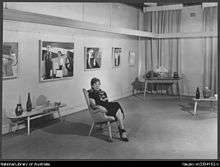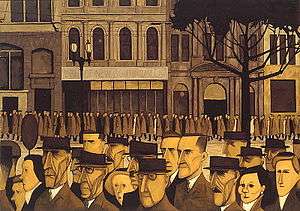Peter Bray Gallery

Peter Bray Gallery (a commercial gallery) was established at 435 Bourke Street, Melbourne, Victoria, Australia in 1951, and closed in 1957.[1] Many of the major names in mid-century Australian contemporary art showed there during its brief, but very busy, lifespan.
Directors
The director/curators were Helen Ogilvie (from 1951 to 1955) and Ruth McNicoll (from Sept 1956 to close). The gallery was owned by Peter Bray,[2] whose interest was in exhibiting pictures and retailing contemporary furniture by Grant Featherston, as it was not unusual in the 1950s to combine the two retail lines into the one establishment[3]
Artists

Originally Stanley Coe Gallery, established in 1950, and taken over by Peter Bray the following year,[4] Peter Bray Gallery showed Australian paintings, sculpture and prints by significant contemporary artists.[5]
As the director of Peter Bray Gallery, Helen Ogilvie (1902-1993) organised exhibitions for such avant-garde[6] artists as John Brack who first exhibited there 27 October – November 1953, again in 1955,[7] then first showed his Racecourse series 5–15 November 1956 and in the same year the gallery sold his most famous work Collins Street, 5 pm to the National Gallery of Victoria.[8]
Also exhibited there were Margo Lewers, Ian Fairweather (April 23—May 3, 1956), Leonard French (who showed his Illiad series, amongst his earliest experiments with enamel house paint on Masonite, October 1952),[9] Inge King,[10] Arthur Boyd (15–24 September 1953), Charles Blackman, Ludwig Hirschfeld Mack (whose first Australian show in a commercial gallery was there in 1953), Helen Maudsley, Sydney Nolan,[11] Clifton Pugh,[12] Michael Shannon, Guy Grey-Smith,[13] David Dalgarno, Ian Armstrong and others.[14]

Charles Blackman unveiled his radical series of schoolgirl paintings at the Peter Bray Gallery in May 1953, establishing his reputation in a decade in which he invented the themes that defined his career. Abstract sculptor Lenton Parr, returning to the country after working as assistant to Henry Moore, held his first Australian exhibition at the gallery in 1957, the same year that Arthur Boyd showed his figurative ceramic sculptures there.[16] Ogilvie, Modernist printmaker, painter and craftsperson in her own right, was engaged with the Crafts Revival of the 1950s and 60s, and made a living designing cutting edge lampshades in London for a period.
Exhibitions at the gallery turned around regularly and were only a week or week-and-a-half in duration. Interspersed with the one-person shows mentioned above were group shows by artists in a particular medium, or by artist groups and societies.[17]
References
- ↑ Prints and Printmaking website.
- ↑ 'Design and Art Australia Online (governed by a Management Committee comprising representatives of the University of Sydney and University of NSW and Chief Investigators)
- ↑ "Most Melbourne galleries then were on do-it-yourself lines, most attached to furniture shops,.." Blackman, Barbara. The Good Ship Mora: Melbourne in the Fifties [online]. Meanjin, Vol. 55, No. 2, 1996: 293-305. Availability: ISSN 0025-6293. [cited 09 Jul 15]
- ↑ Encyclopedia of Melbourne Online
- ↑ Burstall, Tim & McPhee, Hilary, 1941- & Standish, Ann (2012). The memoirs of a young bastard : the diaries of Tim Burstall, November 1953 to December 1954. Melbourne University Publishing, Carlton, Vic., p.298
- ↑ Young people buy pictures. (1952, July 16). The Argus (Melbourne, Vic. : 1848 - 1957), p. 6. Retrieved July 8, 2015, from http://nla.gov.au/nla.news-article23185365
- ↑ Shore, Arnold (1955). 'Artist stresses human values'. (1955, March 8). The Argus (Melbourne, Victoria: 1848– 1957), p. 13. Retrieved July 8, 2015, from http://nla.gov.au/nla.news-article71637449
- ↑ "In 1953, he had his first solo exhibition at Peter Bray's Gallery in Melbourne. Collins Street was exhibited at the same gallery in March 1956 and was immediately purchased by the NGV." McKiernan, M. (2010). 'John Brack Collins Street 5 pm, 1955'. Occupational Medicine, 60(2), 88–89.
- ↑ Johnson, George & Heathcote, C. R. (Christopher Robin) & Zimmer, Jenny, (editor.) (2006). George Johnson : world view. South Yarra, Vic. Macmillan Art Publishing
- ↑ Inge King's art has "the gadget air". (1952, October 21). The Argus (Melbourne, Victoria: 1848–1957), p. 5. Retrieved July 8, 2015, from http://nla.gov.au/nla.news-article23217241
- ↑ "In some cases, it is also the artist’s role to slice Australia open and show it bizarrely different, quite new in its antiquity. Half a century ago, Sidney Nolan did just this with his desert paintings and those of drought animal carcasses. I recall seeing some of these at the Peter Bray Gallery in 1953 and being bewildered by their aridity: a cruel dryness which made the familiar Ned Kelly paintings seem quite pastoral." Wallace-Crabbe, C. (2003). Gallery Notes. Australian Book Review, August 2003, p.38
- ↑ Four art styles. (1955, June 21). The Argus (Melbourne, Vic. : 1848–1957), p. 9. Retrieved July 8, 2015, from http://nla.gov.au/nla.news-article71889225
- ↑ 'Inaugural exhibitions at two galleries' The Age June 5, 1956, p.2
- ↑ See newspaper articles on Peter Bray Gallery held in the National Library of Australia
- ↑ McKiernan, M. (2010). 'John Brack Collins Street 5 pm, 1955'. Occupational Medicine, 60(2), 88–89.
- ↑ Hassall, D. (2015). Arthur Boyd and his' Prodigal son'Mural. Quadrant, 59(1–2), 114.
- ↑ "One Woman — Nine Men". The Argus (Melbourne, Victoria: 1848–1957). Melbourne, Vic.: National Library of Australia. 11 February 1953. p. 4. Retrieved 9 July 2015.